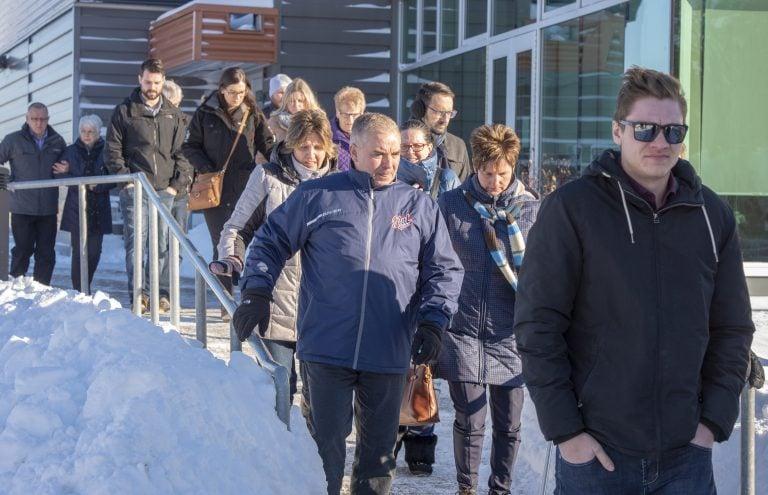Humboldt Broncos families on their ‘tears of anger’ and the healing process
Facing the driver at fault for the crash, friends and family read statements in a makeshift Saskatchewan courtroom: ‘I don’t hate you,’ said one mother.

Family and friends leave for the lunch break at the sentencing hearing for Jaskirat Singh Sidhu on Monday, Jan. 28, 2019 in Melfort, Sask. (THE CANADIAN PRESS/Ryan Remiorz)
Share
For the last 19 hours of Logan Boulet’s life—as he lay in his hospital room battling the kind of injuries that claimed the lives of many of his Humboldt Broncos teammates—his parents sang to him. They read him stories. They tickled his feet. Until he was gone.
Around 11:45am on April 7, 2018, the family was readying to offer life to others by way of Logan’s organ donations. As his mother said in court on Monday: “He will be known as someone who gave right until the end.”
Bernadine Boulet began the victim impact statements—the first of 65 to be read aloud in a courtroom in Melfort, Sask.—for the sentencing hearing of Jaskirat Singh Sidhu, the truck driver at fault for the accident that claimed 16 lives. She spoke about her son’s journey to one day become a teacher, just like her. How she wishes he could shake his leg at dinnertime once more, so she could tell him to stop. Now, she struggles to use the word “death,” she said.
Then Toby Boulet, Logan’s father, in a statement halted by tears and pauses just to catch his breath, said he does not believe Sidhu is an inherently evil person. But while Toby added he’s trying not to let anger win, he’s still not ready to forgive. Grandparents, uncles, cousins, friends, and Logan’s girlfriend also had their own statements. There is no shortage of victims.
READ MORE: ‘It was the last time we saw him’: an oral history of the Humboldt tragedy
One purpose of a victim impact statement is to inform the court of their suffering, in order to help in deciding Sidhu’s sentence. But here, it appears not about the sentence so much as a chance for everyone to let out their emotions.
“To some degree, I don’t know how much of an affect this will have on the sentence,” said Scott Thomas, father to Evan Thomas, in an interview. “To me, this is more for our healing process. To influence the sentencing one way or another way is entirely out of our hands. That’s why I’ve always said I don’t care whether it’s one day or 10 years. We have no control over it.”
Many of the Broncos family sitting in attendance hunched over in silence during the statements. So too did member of Sidhu’s family sitting behind him. Others needed to step out to take a break amid the flow of tears.
On any other day, the makeshift courtroom is a sports venue. The floor has lines to show the boundaries for a game of basketball, volleyball or perhaps even floor hockey. But this week, the stands are pushed back to accommodate seating for more than 500 on the gymnasium floor.
The majority of the seats on Monday were empty, perhaps the cause of poor winter driving conditions over an icy Saskatchewan weekend, but approximately 100 seats are filled by family and friends directly affected by the Broncos. They all held tissues or stress balls offered to them when they took their seats.
After the lunch break, Robin Lukan told the court about how her son, Conner, was a sharp dresser, and how he took his laptop on bus trips to keep up with his schooling. After the bus crash, she had to go to the hospital and touch his face, hairy from his playoff beard, while her daughter hugged her brother’s lifeless body.
Robin’s brother-in-law also was a hockey player. Like Conner, he also wore #12. And like Conner, he also died at the age of 21 in a car crash en route to a hockey game. Twelve days after the crash, Conner’s grandmother died. They said it was a broken heart.
“I have no forgiveness,” Robin tells Sidhu. “No apology or admission of guilt will change that. Right now, I only have tears of anger.”
Melissa Doerksen talks about her dad, the late bus driver Glen Doerksen, who lit up whenever he found out he’d be driving around a hockey team. But, through tears, she also said how much “we miss our Santa at Christmas.”
Darlene Hinz, the mother of statistician Brody Hinz, submitted her statement, but could not finish it, saying it was too hard and she was “emotionally drained.”
When Marilyn Cross, the mother of the late Broncos assistant coach Mark Cross, looked over at Sidhu for her statement, she told him that she sees a man not much older than Mark and that his guilty plea meant a lot, though it won’t bring back her son. “I don’t hate you,” she said. And as Sidhu and Cross looked at each other, she told the man who killed her son to make the world a better place, “just like our son Mark did.”
Sidhu, who had remained silent throughout the proceedings, started to cry.